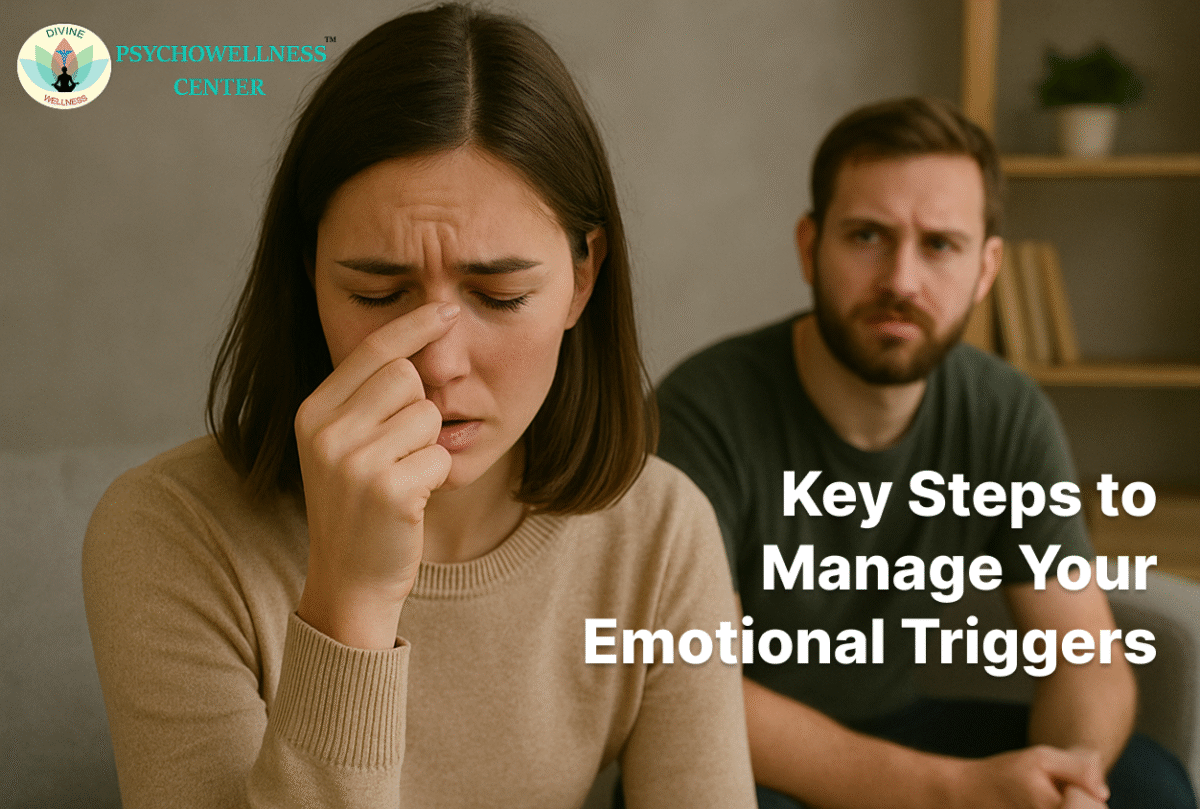We all experience emotional triggers, those specific situations, words, or behaviours from others that provoke a sudden, intense emotional reaction. It might be a tone of voice that reminds you of past criticism, a certain behaviour from a partner that leaves you feeling disrespected, or a colleague’s dismissal of your ideas that stirs up self-doubt, low self-esteem, or anger. These triggers can disrupt relationships, reduce our mental well-being, and cause us to act impulsively if left unexamined.
Learning to manage emotional triggers is not about avoiding emotions but about gaining insight into their roots and developing healthier ways to respond. The following are essential steps you can implement to recognise, comprehend, and handle your emotional triggers.
- Understand What Emotional Triggers Are
A stimulus that causes a strong emotional response is known as an emotional trigger. These are frequently connected to unresolved trauma, depression, unfulfilled needs, or past events. Anger, grief, fear, anxiety,, or embarrassment are just a few of the ways that triggers might appear. Often, they operate beneath our conscious awareness, making us react in ways we later regret. Recognising that these responses are signals rather than flaws is the first step in managing them.
2. Identify Your Triggers
- The next step is to pinpoint what specifically sets you off. Ask yourself:
- What situations or people provoke strong emotions in me?
- What was happening just before I got upset?
- How did I interpret the situation?
For example, you may find you get unusually upset when someone interrupts you, which could be linked to a deeper belief that your voice doesn’t matter. Journaling or reflecting after emotional episodes can help uncover patterns and themes.
Common triggers may include:
- Feeling ignored or dismissed
- Being misunderstood
- Facing criticism
- Experiencing rejection or betrayal
- Losing control over a situation
Each trigger is personal and deeply tied to your unique history.
3. Explore the Root Cause
Unfulfilled emotional demands or old wounds are frequently the source of triggers. For example, childhood neglect might create a sensitivity to abandonment in adult relationships. By tracing your emotional reactions back to their source, you gain clarity on why certain situations feel so charged.
Ask yourself:
- When did I first feel this way?
- Is my reaction proportionate to the current situation?
- What does this remind me of?
Therapy or guided self-reflection can be powerful tools in uncovering the origins of your triggers. Understanding the root cause helps to depersonalise the reaction and develop compassion for yourself.
4. Notice the Physical Signs
Emotional triggers manifest in your body in addition to influencing your thinking. These physical cues can serve as early warning signs that you’re being triggered. Mind-body awareness is crucial. Once you learn to spot these sensations, you can intervene before the emotional response spirals out of control.
5. Pause and Breathe
A pause, even just a few deep breaths, can break the automatic cycle of reaction.
Try this grounding technique:
- Inhale deeply for 4 counts
- Hold for 4 counts
- Exhale slowly for 6–8 counts
This simple breathing practice engages the parasympathetic nervous system, calming your stress response and giving you time to reflect rather than react.
6. Name the Emotion
Labelling your emotion helps to disarm its intensity. Saying, “I feel hurt,” or “I feel disrespected,” activates the rational part of your brain and reduces the emotional overwhelm.
Psychologist Dan Siegel describes this as “Name it to tame it.” When you can articulate what you’re feeling, you begin to take back control. It also makes it easier to communicate your needs to others without blaming or escalating conflict.
7. Challenge Your Inner Narrative
We frequently react not only to the actual event but also to the narrative we give ourselves about it. For example:
- “She interrupted me because she thinks I’m stupid.”
- “He didn’t reply because he’s ignoring me.”
8. Communicate Mindfully
If someone has triggered you, consider expressing how you feel using “I” statements rather than blame. For example:
This invites dialogue rather than defensiveness and allows space for resolution and mutual understanding.
9. Practice Self-Compassion
It’s easy to beat yourself up for being “too sensitive” or overreacting, but harsh self-criticism only deepens emotional pain. Instead, respond to yourself with kindness:
- “It makes sense I reacted that way, given my past.”
- “I’m doing the best I can right now.”
Self-compassion strengthens emotional resilience and helps you heal the wounds behind the triggers.
10. Develop Healthy Coping Strategies
Replace reactive behaviours with constructive coping mechanisms such as:
- Journaling
- Walking or movement
- Meditation
- Talking to a trusted friend
- Engaging in a hobby
- Practicing gratitude
Building emotional regulation skills over time enables you to respond to triggers in ways that align with your values.
Conclusion
Managing emotional triggers isn’t about eliminating all uncomfortable emotions; it’s about learning to respond rather than react. Every trigger presents a chance to gain a deeper understanding of who you are and mend past hurts. With patience, curiosity, and consistent practice, you can develop emotional mastery and strengthen your relationships, confidence, and overall well-being. Remember, it’s a journey, not a destination. Be gentle with yourself along the way.
Contributed by Ms. Srishti Jain, Counselling Psychologist
This blog was posted on 27 June 2025
References
- Kabat-Zinn, J. (2003). Mindfulness-based interventions in context: Past, present, and future. Clinical Psychology: Science and Practice, 10(2), 144–156. https://doi.org/10.1093/clipsy.bpg016
- Linehan, M. M. (2014). DBT® skills training manual (2nd ed.). Guilford Press.
- Neff, K. D. (2003). Self-compassion: An alternative conceptualisation of a healthy attitude toward oneself. Self and Identity, 2(2), 85–101. https://doi.org/10.1080/15298860309032
- Siegel, D. J. (2012). The developing mind: How relationships and the brain interact to shape who we are (2nd ed.). Guilford Press.

